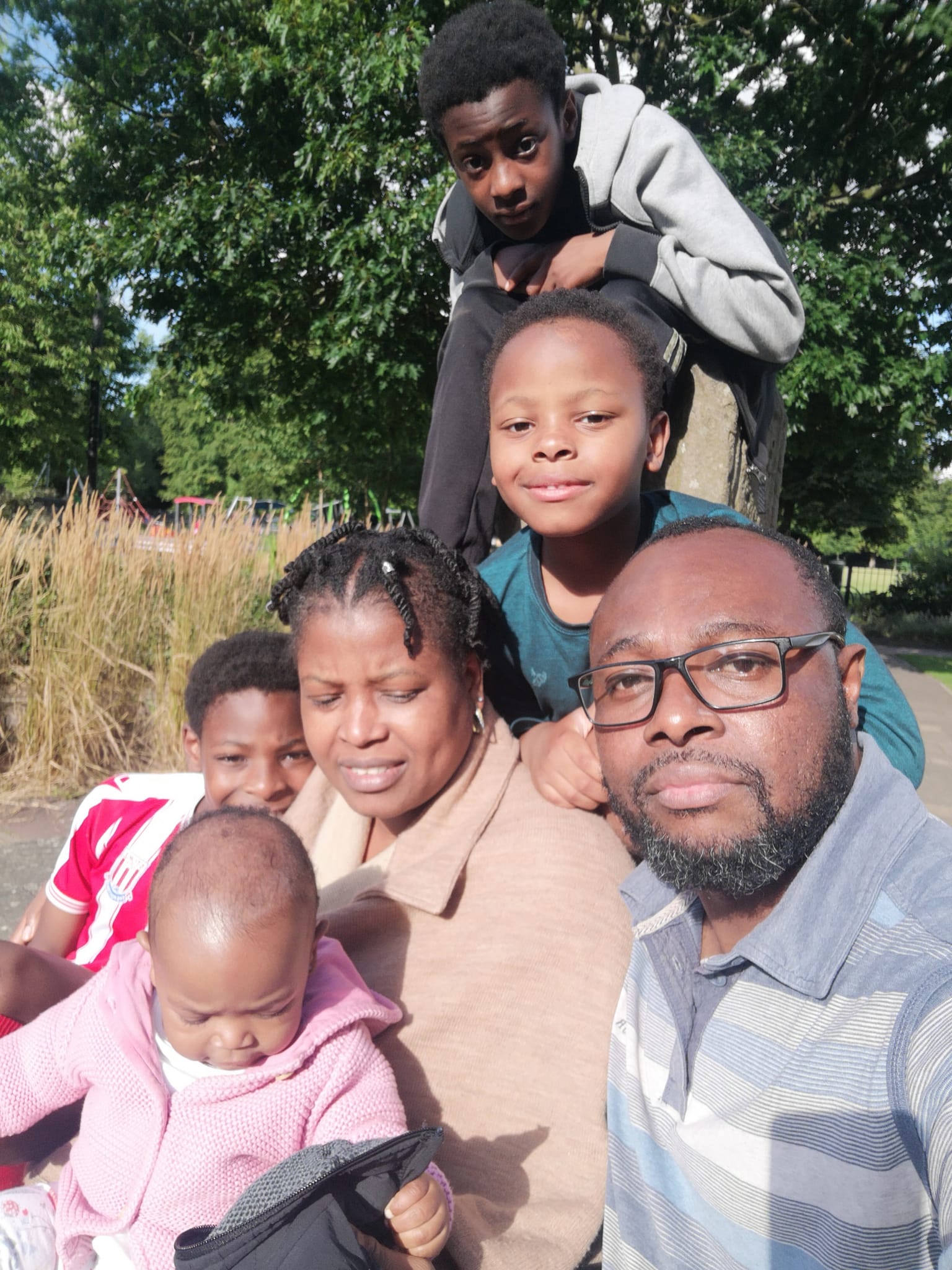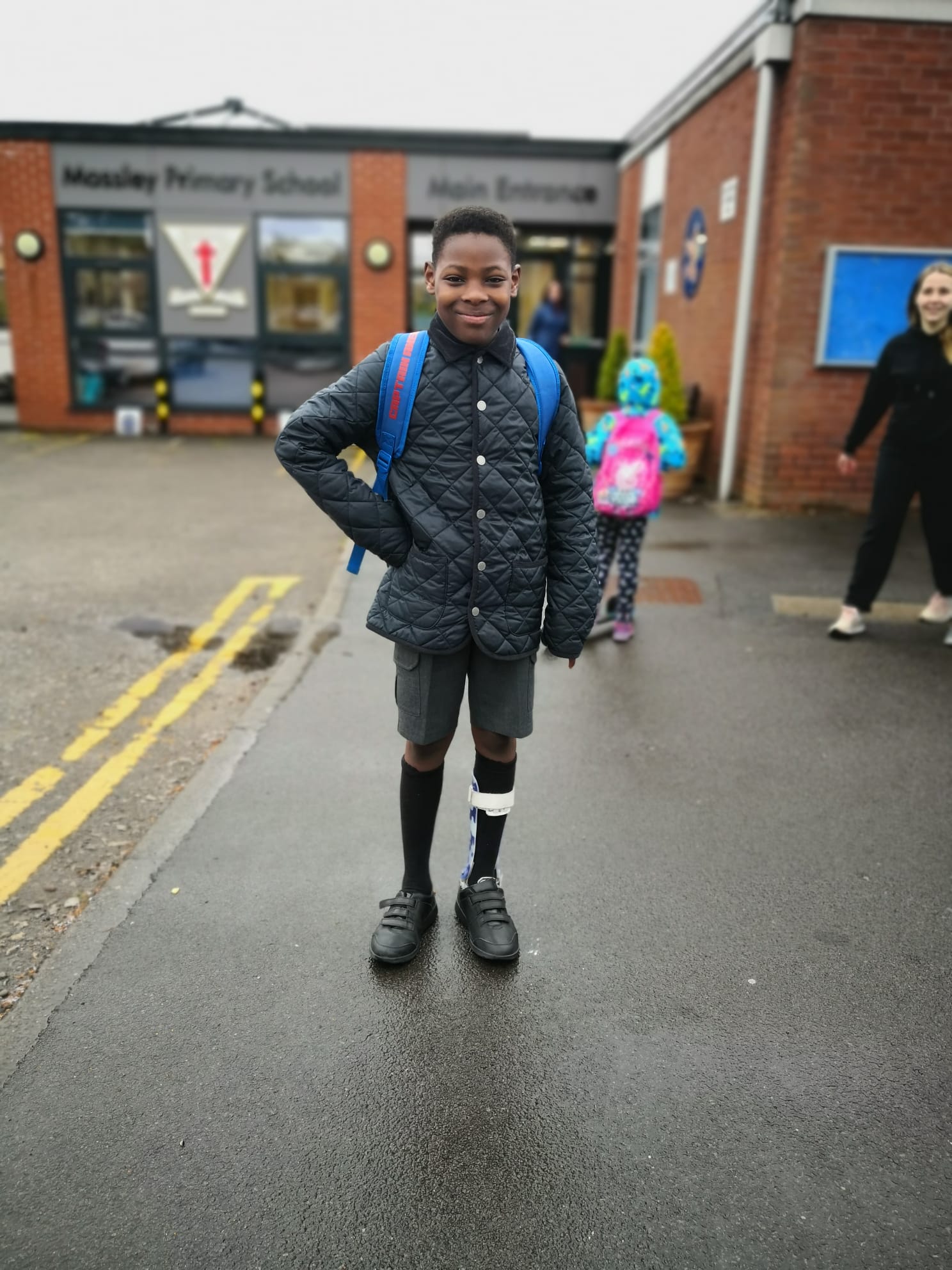Mother’s fears for son with cerebral palsy as all benefits withdrawn by Home Office ‘with no explanation’
Mother-of-four Mercy Edwards-Okafor had her disability living allowance suddenly removed after living in the country for 13 years
The mother of a 9-year-old boy with cerebral palsy fears for her family’s future after all her benefits were removed by the Home Office with no explanation.
Mercy Edwards-Okafor and her husband Edward had been receiving disability living allowance and working and child tax credits for about three years but have suddenly had all their support removed.
Mr Edwards-Okafor works long shifts as a care assistant and barely makes enough money to keep his family fed and warm.

The mother-of-four is a full-time carer for their son Chima while also looking after 11-year-old Elisha, 6-year-old Elias and 8-month-year-old Matayla, at home.
Have you been affected by this story? If so email holly.bancroft@independent.co.uk
The family came to the UK from Nigeria around 13 years ago and have leave to remain.
But when renewing their visas in August this year, the Home Office imposed no recourse to public funds.
Under the public funds condition of the grant letter, the department simply stated: “You cannot claim public funds” with no explanation.
In 2021 some 118,100 people were given leave to remain in the UK, subject to having no recourse to public funds. That represented a huge rise on 69,800 people in 2020 and was also up on 109,900 in 2019.
“I’m worried that we won’t have enough money to take care of the children,” Mrs Edwards-Okafor told The Independent. Her family, who live in Congleton near Manchester, have already had experience of being in debt and she doesn’t want them to be put in the same position again.
“I’m scared about being able to put food on the table, being able to transport Chima, being able to take him to have his treatment in Manchester or in Macclesfield,” she said.

Chima’s cerebral palsy affects the left side of his body meaning his balance is affected and he needs a splint on his leg. He is unable to use his left hand at all and requires assistance doing simple tasks.
Mrs Edwards-Okafor takes him to occupational therapy, physio treatment and speech and language therapy and has noticed the rising cost of travel.
“Everything is going up,” she said. “We used to normally pay around £70 for energy each month, now we are paying £179 - that’s a big jump for us.

“Where we used to spend £80 on a food shop and we had enough, now we spend around £100 just to be able to have food on the table,” she continued.
“The cost of transport has shot up as well. Before we could go to Manchester for £50, now the last time we went it was £70.”
She said she didn’t know how their family will cope without financial support. When she found out that the Home Office had withdrawn all the families’ benefits, she said she was in shock.
“In the night, the thought comes to me that we don’t have any right to public funds,” she said. I don’t know how we will cope. We don’t know what the future is going to hold,” she said.
Her husband works night shifts as a care assistant so that he can help her with childcare during the day.

“It’s really stressful because at some times I don’t sleep. I have to go back to work tonight and I sometimes only get three hours sleep,” he told The Independent.
“We are just trying to see how we can make ends meet. I have to do night shifts because that is the only way I can come back home and give support to the family.”

One of his sons loves playing football and came home from school asking to go see a football match. “I said not now because it is very expensive. I told him that when he has money he can do those things,” Edward said.
“It’s difficult because we try and encourage them when we can but we also let them see our situation,” he said.
“I pay money to the state in my taxes but the state is saying it will not help me.”
In 2020, the Home Office promised to assess the ‘no recourse to public funds’ policy to see whether it met the requirements of the Equality Act. The department committed to “monitor the effect of the policy in relation to disability”.
Nick Beales, from Refugee & Migrant Forum of Essex and London, who has been helping the family, said: “During the pandemic there appeared to be a more flexible approach to imposing the no recourse to public funds (NRPF) condition, but now we are seeing NRPF being imposed far more.
“It’s absolutely clear in the cases we are handling that conditions should not be imposed. In one case we are supporting a terminally ill person who [the Home Office] decided can survive without access to any sort of state support. They have agreed to reconsider the case at the beginning of September but they still have not issued any form of response.

“Mercy and her family are clearly reliant on disability benefits to make ends meet. They will not be able to meet their family’s essential living needs without them.
“The vast majority of people don’t want to be claiming public funds. They want to have a high enough salary that means they don’t have to claim them, but jobs simply don’t pay enough.
“It is absolutely clear from the evidence that this family cannot survive without state support. Because of the child’s disability, it is also clear that Mercy cannot work full-time.”
Labour MP Stephen Timms, chair of the Work and Pensions Committee, told The Independent that he couldn’t see why Mercy and her family have suddenly had NRPF imposed when it hadn’t been applied previously. “Where the children are British citizens, as one of Mercy’s children is, then child benefit should at least be payable,” he argued.
“These children are British citizens and they are not going anywhere. They are here for the long run and there is a really compelling case for saying that parents should be eligible for child benefit.
“We should invest in these children just as we do with British children.”
The Committee have recommended this to the government but the policy has been rejected by the Home Office, he said, adding that no family with children should have no recourse to public funds imposed for more than 5 years.
A government spokesperson said they did not comment on individual cases, but added: “The provision of No Recourse to Public Funds has been upheld by successive governments and maintains that those coming to the UK should do so on a basis that prevents burdens on the taxpayer.
“However, there are safeguards in place to ensure vulnerable migrants who are destitute and have other needs, such as supporting children, can receive help and can also apply to have the conditions lifted.”
Join our commenting forum
Join thought-provoking conversations, follow other Independent readers and see their replies
Comments


Bookmark popover
Removed from bookmarks